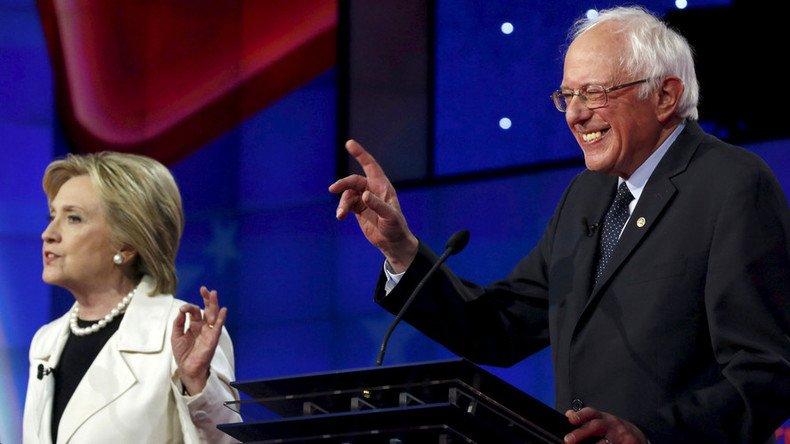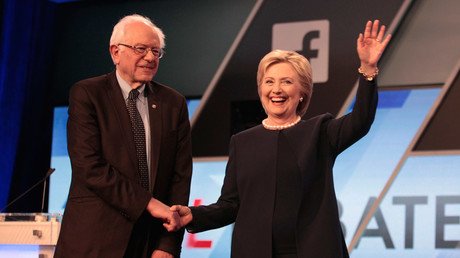‘NY primary: Clinton-Sanders ‘Do-or-Die’ moment’

Though New York State is a ‘do-or-die’ state for both Democratic presidential hopefuls, due to Clinton’s incrementalism and Sanders’ stump speech their debate on April 14 didn’t become a clash of the Titans, says political cartoonist Ted Rall.
RT: Clinton had first refused to take part in debates in New York due to the "tone" of Sanders' campaign. Can you comment on what might be the real reason for such a move?
Ted Rall: I think she is sensing trouble. Until about two-three weeks ago it seemed pretty obvious that Secretary Clinton was going to carry New York State. At this point the latest tracking polls show her about 12 points ahead in New York, which under ordinary circumstances should give her room for comfort. However, just the day before the Michigan primary, she was 21 point ahead of Bernie Sanders and yet he won, nevertheless. I think she is a little bit worried about a repeat there.
RT: Quite a few news outlets have called the debates to be one of the most important in the race with Clinton's home state at stake. In your opinion, did the debates live up to the media expectations? And why is New York so important?
TR: I am going to do that in reverse order. New York State is absolutely a ‘do-or-die’ state for both Bernie Sanders and Hillary Clinton. At this point it is almost safe to say that whoever wins New York will become the democratic nominee. To explain that a little bit: Hillary Clinton has a substantial lead in both pledged delegates and a huge lead in superdelegates. Nevertheless, if she doesn’t win her home state of New York, the superdelegates would be forced to radically reconsider whether or not she is a viable candidate for the Democratic nomination. And they would be allowed under the rules to change their votes; they are not bound to their current votes. And her leading pledged delegates might really vaporize in the coming months heading into the final primary in California in June.
And Bernie Sanders also has a ‘do-or-die’ moment here as well. If he can pull an upset in New York, it really could mean the he will be the democratic nominee. Why did this lead up to the expectations of the media as a huge clash of the Titans? No, it really did not. Everyone was looking for something different from both candidates. People were looking for Hillary Clinton to promise something bold and decisive, something that was exciting more than the incrementalism that we’ve seen in her campaign so far. That didn’t happen. People were looking for Bernie Sanders to articulate an interesting different deviation from his standard stump speech. And certainly a broader view of foreign policy, that didn’t happen neither. It was kind of a disappointment. The truth is this was the ninth debate, it did not feel different from the previous debates.
RT: Bernie Sanders seems more passionate about his promises: take minimum wage, free health care, for example. If Sanders does win, how realistic is that he will be able to put his promises into practice? And which ones of them seem to be too good to be true?
TR: I think the thing that is interesting about Bernie Sanders is that he is willing to try to actually change things in a substantive way. My personal view of the current system, and I am not just talking about the fact that there are Republicans in charge of both Houses of Congress, the House and the Senate, but just the system in general. I do believe that Bernie Sanders as president would probably be a failure in the sense that he would not be able get his agenda put across. But in a broader sense, he would be a success in that he would expose the fact that it is the nature of the system itself that is the problem. The American system itself is non-responsive to the needs of the vast majority of the working and the middle class of the US. A president Sanders would be able to; unfortunately this is not something that he would want to hear, but his failure to get a very popular agenda enacted would show and expose the fact that the US system itself is non-responsive to its own citizens. And in that sense it really would be a very important move for the American people so that they could decide that it is not a personality issue, it is not a question of whether Ted Cruz or Donald Trump or Hillary Clinton or Bernie Sanders will become president - it is a question of what kind of system we want here.
The statements, views and opinions expressed in this column are solely those of the author and do not necessarily represent those of RT.













